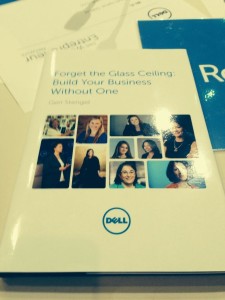By LAURA LOREK
Founder of Silicon Hills News

Panel on the Gender-GEDI study, sponsored by Dell, at the Dell Women’s Entrepreneur Network conference in Austin, photos by Laura Lorek.
Men and women do not have equal opportunity when it comes to launching a business today.
In fact, 75 percent of 30 countries surveyed for the second annual Gender Global Entrepreneurship and Development Index, commissioned by Dell, do not meet the basic needs for female entrepreneurs to launch a business.
“If there is a single message it’s that it’s not just a personal choice,” said Ruta Aidis, project director for the Gender-GEDI study. “There are conditions that prevent women from founding high growth businesses.”
Those conditions include lack of access to basic financial resources like a bank account, lack of access to education, technology, networks and the lack of equal legal rights for women, she said.
“It’s not acceptable,” Aidis said. “These are impediments to high performance female entrepreneurship.”
Aidis spoke during a lunchtime media presentation at the Dell Women’s Entrepreneurship Network conference being held at Austin City Limits and the W Hotel in Austin. The invitation-only global conference, which kicked off Sunday and concludes Tuesday, brings together top women business owners to discuss their most pressing business issues and to talk about technology solutions.
This is the fifth year Dell has hosted the conference. Last, year it was held in Istanbul and previously in New Delhi, Rio de Janeiro and Shanghai. The female business owners in attendance run fast-growth mid-market companies with more than 50 employees and revenues of $3 million or more. They come from 14 countries including Australia, Brazil, Canada, China, France, Germany, Japan, India, Mexico, Peru, South Africa, Turkey, U.K. and the U.S.
It’s the second time Dell has collected data on female entrepreneurs around the world. Last year, the Gender-GEDI study examined 17 countries and this year, the study expanded to examine female entrepreneurship trends in 30 countries.
The goal of the study is to help country leaders, policymakers and law-makers help women entrepreneurs succeed by providing them with basic tools, help and resources, said Karen Quintos, senior vice president and chief marketing officer at Dell.
Accountability at all levels of a country is needed, Quintos said. Supporting entrepreneurship for women makes economic sense and can help a country financially, she said.
“If a woman can earn an income, 90 percent of what she earns she can plow back into the community,” she said.
Creating an awareness of the plight of female entrepreneurs worldwide helps lead to change, she said.
For the second year in a row, the U.S. topped the list of most favorable conditions for high-growth potential female entrepreneurs followed by Australia. Other top countries included Sweden, France, Germany, Chile, the United Kingdom and Poland.
“The remaining 23 of the 30 countries studied received an overall index score of less than 50 out of 100, indicating that many of the fundamental conditions for high potential female entrepreneurship development are generally lacking in the majority of countries,” according to the study.
One of the best ways to support female entrepreneurs is to tell their stories, said Ingrid Vanderveldt, former Entrepreneur in Residence at Dell.
A lot of women lack self-confidence to launch a business, she said. Providing examples of women who have done it can help others, she said.
 Dell is putting the spotlight on successful female entrepreneurs at this conference. It also highlights ten successful female entrepreneurs and tells the story of how they overcame obstacles in the Dell commissioned the free e-book “Forget the Glass Ceiling: Build Your Business Without One.”
Dell is putting the spotlight on successful female entrepreneurs at this conference. It also highlights ten successful female entrepreneurs and tells the story of how they overcame obstacles in the Dell commissioned the free e-book “Forget the Glass Ceiling: Build Your Business Without One.”
They study also revealed 14 of the 30 countries do not provide female entrepreneurs with access to financing like bank loans, credit lines, etc. And worldwide women receive a tiny share of venture capital.
The study also found many industries remain male dominated, particularly in the science, technology, engineering and math industries, known as the STEM fields.
It also revealed female startup activity is on the rise in emerging markets.
“Despite being ranked as top performers and characterized by overall favorable business environments, opportunity perception is fairly low in the United States and Europe with less than one third of the female population measured identifying business opportunities,” according to the study. “In Africa, this number reaches 69 percent.”
![]() Vanderveldt first connected with Dell at the first Dell Womens for Entrepreneurs Network program in Rio de Janeiro, Brazil and in September of 2011, she joined the company as its first EIR. At Dell, she helped to create the company’s Center for Entrepreneurship website, which provides access to technology, expertise and capital through programs like the Dell Innovators Credit Fund, Dell Financial Services and Dell Ventures.
Vanderveldt first connected with Dell at the first Dell Womens for Entrepreneurs Network program in Rio de Janeiro, Brazil and in September of 2011, she joined the company as its first EIR. At Dell, she helped to create the company’s Center for Entrepreneurship website, which provides access to technology, expertise and capital through programs like the Dell Innovators Credit Fund, Dell Financial Services and Dell Ventures.
